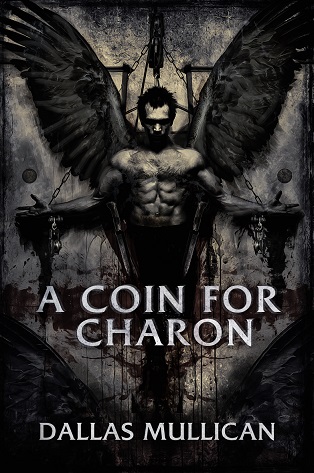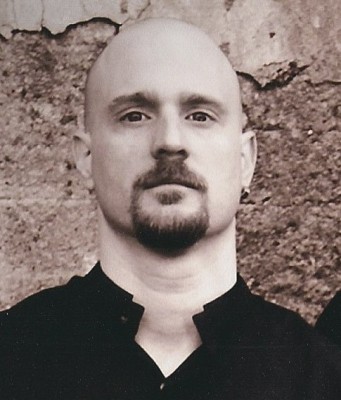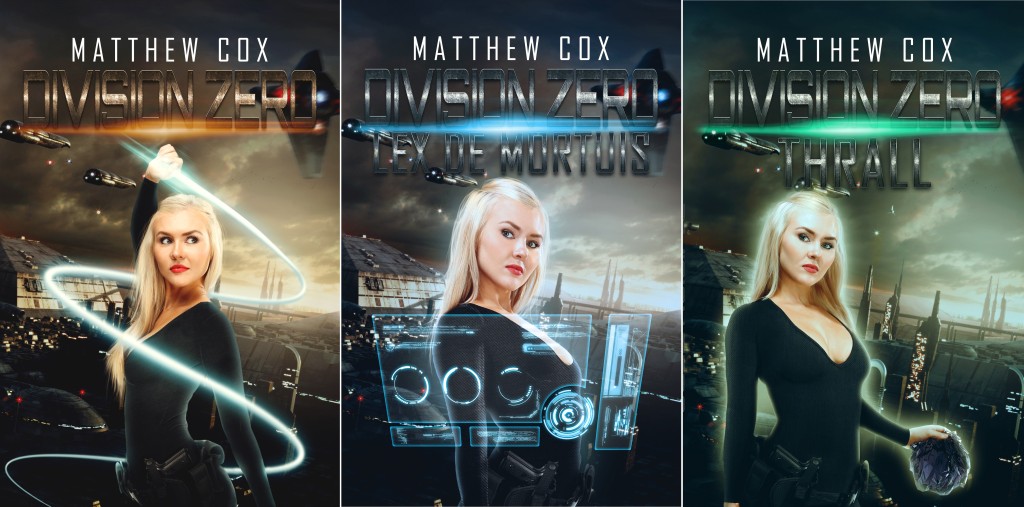Happy Saturday all. I’m not quite twenty minutes back in the door from attending the Collingswood Book Festival. It’s been a long day – I haven’t gotten out of bed earlier than 8 am in a long damn time. (5:14 am this morning… /shudder). The weather was meh, which forced the festival inside, but I got a chance to meet a lot of people. All in all it was a blast.
Anyway, on to the subject at hand. I’ve decided to try this whole author interview thing out for the blog, and my first guinea pig is Dallas Mullican, author of A Coin for Charon. I want to extend my thanks to Dallas for participating, and wish him the best with his debut novel. I had the chance to read this book a little while ago, and it is quite good. (Review at the end of the interview)

A striking cover (by Dean Samed of Conzpiracy Digital Arts) sets the tone for this novel.
Book Description
Gabriel isn’t murdering anyone―he’s saving them.
The media has dubbed him the Seraphim Killer. He believes the gods have charged him to release the chosen, those for whom life has become an unbearable torment. Gabriel feels their suffering—his hands burn, his skull thunders, his stomach clenches. Once they are free, he places coins on their eyes to pay Charon for passage into paradise.
Detective Marlowe Gentry has spent the past two years on the edge. The last serial killer he hunted murdered his wife before his eyes and left his young daughter a mute shell. Whenever she looks at him, her dead eyes push him farther into a downward spiral of pain and regret. He sees the Seraphim as an opportunity for revenge, a chance to forgive himself―or die trying.
Gabriel performs the gods’ work with increasing confidence, freeing the chosen from their misery. One day, the gods withdraw the blessing―a victim he was certain yearned for release still holds the spark of life. Stunned, he retreats into the night, questioning why the gods have abandoned a loyal servant. Without his calling, Gabriel is insignificant to the world around him.
He will do anything to keep that from happening.
Interview

- How long have you been writing and why/how did you decide to write a novel?
I spent 20 years as a singer in bands. Once stint strutting about a stage ended, I needed a new creative outlet. I received BA’s in English and Philosophy and decided I should put all those student loans to some kind of use. I’ve always written—lyrics, short stories, poems—since I was young, so after music I simply focused on writing full time. I doodled at a novel off and on over many years and finally finished it up. It wasn’t great. Some good ideas, but I had a long way to go with structure, dialogue, pacing, you know, the little things. I learned a ton through the process and continued to develop my voice and hone my technical skills.
- What books would you consider your strongest influences?
There are different phases that have influenced me over the years, and all remain firmly lodged in the ol’ noodle, coming out at various times. King, Barker, and McCammon from my earlier years. Poe, Lovecraft, F. Paul Wilson, Brain Lumley, from high school. Faulkner, Fitzgerald, Gabriel Garcia Marquez on the literary side from college, and on the philosophical side, Nietzsche, Kierkegaard, Sartre, Kafka, and Dostoevsky. More recent authors who have influenced me would be Steven Erikson, Neil Gaiman, and Thomas Harris.
- What genre of novel do you enjoy most to read? To write?
In reading, I mostly read philosophy and classical lit, but I do enjoy epic fantasy with a dark side like Erikson, Martin, Joe Abercrombie, Brent Weeks, Scott Lynch and others. In writing, I like themes with a dash of horror, but horror that takes place in the mind, which I find to be the most disturbing and frightening. I enjoy writing dark fantasy and developing new worlds and new mythologies. I don’t like to be restricted by genre, but delve into a wide array of styles and subject, yet always on the darker side of things.
- Tell us a bit about A Coin for Charon.
The novel follows four main characters who are either haunted by pasts they can’t escape, or presently dealing with problems that seem beyond their ability to cope with. The murders of a serial killer in the city cause theirs lives to collide in a myriad of ways. Gabriel, the killer, is targeting victims who are deeply depressed and/or suicidal. He believes the gods have called him to end their suffering and usher them into paradise. The novel examines how our pasts and experiences define us, and to a great extent, dictate what we do.
- What inspired A Coin for Charon, are any of the characters based on real people or events?
My first novel was an exercise, a weird amalgamation of existential philosophy, surrealism, and literary fiction—a bit too ambitious for a first time author still learning my chops. I shelved it and set out to write something more accessible while retaining much of my penchant for philosophy and working outside the box. Reading serial killer fiction and non-fiction in my younger years certainly influenced the decision to write a psychological thriller. Novels by Thomas Harris, Boris Starling, and John Connolly, as well as non-fiction by the likes of Harold Schechter, were among my favorites. But as is the case with most genre fiction, certain tropes become predictable and stale, requiring a new direction to freshen them up. I wanted to find that new direction and offer a different take on the subject. In an attempt to accomplish this, I focused more on the characters and their individual psychologies and the macro-philosophy tying them all together. Additionally, I tried to play with the tropes and give the killer and detective in particular, very different backstories, or twist the typical backstory in a new way.
- What’s been the most surprising reaction you’ve gotten to your writing? Best? Worst?
Best has been the overwhelming praise for the book. Most surprising has been the overwhelming praise for the book, ha. I had no idea how it would be received, and I have been thrilled with the response. So far, I can’t cite anything all that negative. It’s a stressful process, trying to get published, then waiting and hoping readers will find it, buy it, and enjoy it. I don’t think I’ll ever get used to that part of being an author.
- What do you consider the unique touch you’ve brought to the crime thriller genre with A Coin for Charon?
The psychological and philosophical elements aren’t usually as much of a focus in the genre as I have made them. I think my use of surreal horror is outside the norm as well. All the elements of the psychological thriller are present—a creepy killer with a ritualistic MO, a detective with a troubled past—but again, I hope I have taken those tropes in a different direction and added a few new ingredients to the mix.
- Literary works often get analyzed for ‘hidden meaning,’ whether or not these meanings were the intention of the authors. I once had a teacher who swore that the black character in Full Metal Jacket taking a bullet in the foot was meant as a deliberate reference to a Soul Brother getting shot in the sole. (No idea if Kubrick meant that or not.) Are there any intentional references/metaphors in A Coin for Charon?
I use tons of foreshadowing, symbolism, and metaphor, but I like the reader to find those and decide how they represent the action or themes. One I will share with you is the dream Max has about the crow and Pain. This dream represents Max’s struggle to go on, to face the rest of his life knowing it will be one of suffering and madness, versus his desire to end his life and avoid those eventualities.
- Is the character of Koop at all inspired by the former surgeon general who bears the same name? (C Everett Koop)
Ha, not at all. The name is influenced by a friend of the family, a highly esteemed doctor and researcher.
- Did you have any preconceptions about becoming published where the reality turned out quite far from what you’d expected.
After wading through the mire of niche music for 20 years, I had a good idea of what to expect. It’s a marathon and not a sprint. I accept I’m an unknown newbie, and it will take time to build a base. With that said, the reaction of those who have read the novel is beyond my expectations. I couldn’t be more pleased with how much readers seem to be enjoying it. I have a great publisher in Winlock Press, who has made the process easy, and for the most part, pleasurable. Ha. I’m a worrywart and perfectionist, so I stress over every step—is it any good, will anyone buy it and like it? It’s a constant emotional rollercoaster.
- Did the title of A Coin for Charon inspire the story, or did you derive the title after you had the story? What thought process went into titling your novel?
Once I developed Gabriel’s MO and backstory, the fact he merges Christian and Greek Mythologies to escort the suffering into paradise, the title leapt out. He also places coins on the eyes of his victims as payment to Charon. Charon boating the dead into the underworld as a metaphor for Gabriel’s actions felt like a natural representation of the novel as a whole.
- In A Coin for Charon, you deal with some heavy issues such as spousal abuse, suicide, and depression. Between the cop, the doctor, and the cancer patient, who do you think shows the strongest inner resolve, and which character the least? How do you think Marlowe and Becca’s lives would’ve gone if they never met?
That’s another theme I want the reader to decide. It’s a central question raised in the book. Given each character’s past and present, could they have done differently? Did they act as their experience and natures dictated? Each, in many ways, is a different aspect of the same persona, so if one changed places with another, would the outcome have been any different? I think the lives of all the character would have turned out very different if their paths had not crossed. Whether for better or for worse, I’ll let the reader decide.
- The hallucination/nightmare scenes are exquisitely creepy and vivid. What inspired these? (And do your dreams look like this?)
Years of reading horror and fantasy, as well as being something of a horror movie aficionado, have given me a plethora of images to draw from. I have very vivid dreams, which also supply no shortage of ideas.
- Tom Clancy said “The difference between reality and fiction is that fiction has to make sense.” What’s been the most difficult aspect of your story to keep plausible in the minds of readers?
It’s a fairly complex novel with a lot of story lines and themes running through the course of the book. Keeping everything straight, making certain each event has some importance toward the whole, is a constant concern. I hate filler and want even seemingly trivial events to have greater meaning down the road. I want everything, in the end, to make logical sense, and for the reader to be surprised while still understanding why/how it resolved as it did.
- Tell us a bit about your upcoming projects. Do you have another book on the way? What’s in store for Marlowe in the future?
My next book to hit the market is the first in a dark fantasy series. Entitled Blood for the Dancer, it’s a very different take on angels and demons. I’ve just finished up the draft for the second Marlowe Gentry novel, The Dark Age, which will see Marlowe caught up in a hell on earth, dealing with a string of calamities, and of course another madman.
Links:
A Coin for Charon on Amazon – http://www.amzn.to/1W0zaUw
Facebook – http://www.facebooks.com/authordallasmullican
Twitter – @dallasmullican
Winlock Press – http://www.winlockpress.com
My Review
In A Coin for Charon, Dallas Mullican has created a gritty contemporary thriller with overtones of the paranormal. The author delves so deep into the head of the killer that the reader is right there with him, never quite sure if this is a madman or someone truly doing the work of God. As a delusion, it is portrayed with enough depth to the point of being indistinguishable from reality. Perhaps Gabriel really is doing the work of a divine agency?
Detective Marlow Gentry has some issues. His wife was murdered by a serial killer he underestimated, and his young daughter left a hollow shell of the happy child she had once been. His career, once promising due to his almost psychic knack for solving cases, is riding up on two wheels and threatening to run right off the rails. Between the stresses of his job, the heavy burden of guilt he feels at not taking ‘the shot,’ and his grief at his surviving-but-absent daughter leave his fuse short enough to threaten his job.
When a new serial killer surfaces in Marlow’s stomping grounds, it takes him back to the case that cost him his family. In the Seraphim Killer, Marlow sees a second chance… a way to redeem himself in his own eyes, and soon he is consumed by an unrelenting drive to solve this case.
In Gabriel, Mr. Mullican presents us with a serial killer with a deep and disturbing background that explains his particular methodology. (I’m not sure if the captive bolt gun is intended as an homage to Anton Chiurgh or a bloody coincidence though.) Gabriel believes he is doing the work of God in freeing the souls of people who have lost the will to live. I found the portrayal of his character to be simultaneously horrifying and sympathetic. Being in Gabriel’s head, one cannot help but wonder if the strange feelings, voices, and messages from the higher power are real or exist only in his imagination. The line between hallucination and reality is as Gabriel sees it.
Supporting Marlow and Gabriel is a cast of unique characters, drawn together by the events of the story. I found Koop a needed dose of humor in an otherwise heavy/dark story. Marlow’s relationship with his partner Spence is also good for a chuckle or two, but never feels forced despite what is going on around them.
With Marlow closing in on Gabriel, tensions rise as a terminally ill man who has seen news of the Seraphim killer seeks him out… and right when Marlow thinks his life is coming back together, it’s about to fall apart before his eyes–again.
This was one of those books that makes you growl at clocks because you don’t want to put it down even when you should be doing other things like… oh, sleeping or dealing with that whole ‘day job’ thing. Fans of detective stories and crime fiction will devour this book.

